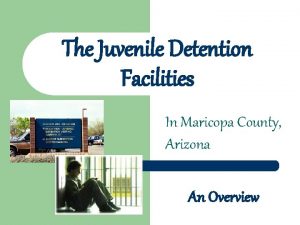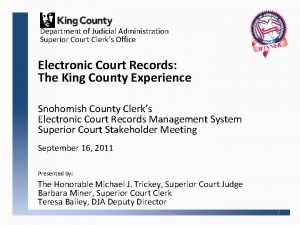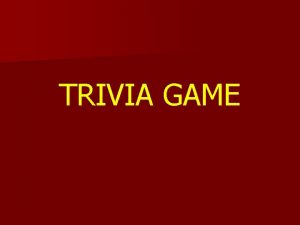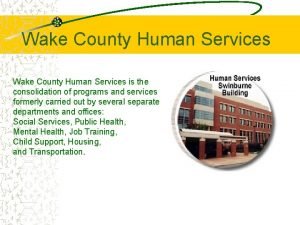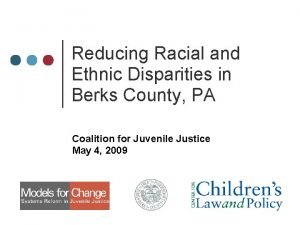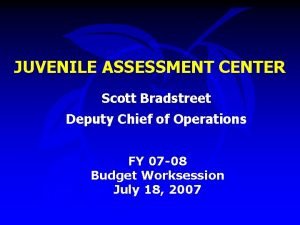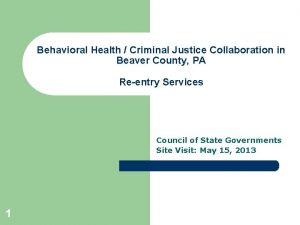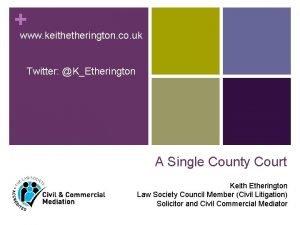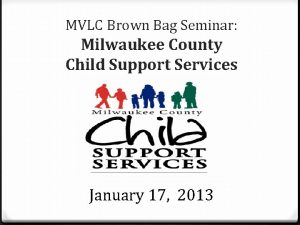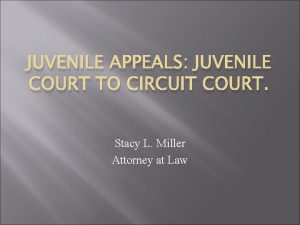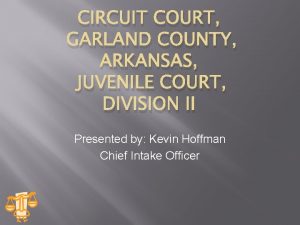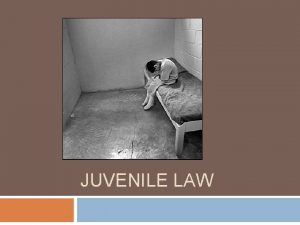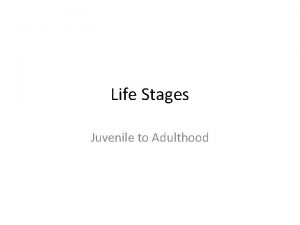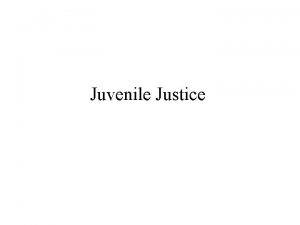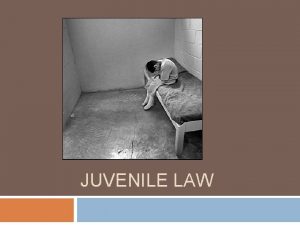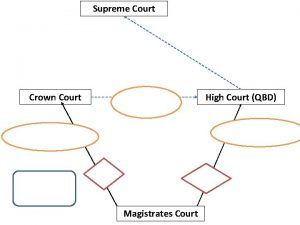KING COUNTY JUVENILE COURT SERVICES OVERVIEW OF JUVENILE













- Slides: 13

KING COUNTY JUVENILE COURT SERVICES • • • OVERVIEW OF JUVENILE COURT DIVERSION & OTHER ALTERNATIVES TO COURT COMMUNITY PARTNERSHIPS & PROGRAMS PRESENTATION TO THE SOUTHEAST SEATTLE EDUCATION COALITION NOVEMBER 21, 2019

King County Juvenile Court Overview Criminal: Handles cases involving young people under 18 referred by law enforcement to the prosecutor. Between January 1, 2019 and September 30, 2019: • Charges in 60% of cases referred by law enforcement were diverted to alternative programs and community-based services. • 40% of cases referred by law enforcement were filed and will be heard by 1 of 3 Juvenile Court Judges.

Civil – Dependency & Becca Services • Dependency Petitions & Hearings • Becca (At-Risk Youth, Child in Need of Services, Truancy) Petitions & Hearings • Case Appointed Special Advocates (CASA) • Dependency Mediation • Dependency Early Resolution Case Manager • Parents for Parents • Family Treatment Court

King County Detention Statistics Between January 1, 2019 and September 30, 2019: • There were 762 admissions to secure detention. • • • 38% of referrals from law enforcement resulted in the secure detention of a youth. The Average Daily Population (ADP) of youth held on juvenile matters in secure detention was 34. 3. • • Compared to the same period in 2018, this is a 10% reduction in admissions. Compared to the same period in 2018, this is an 8% reduction in ADP. Referrals, diversions, prosecution, legal cases and detention rates have dropped dramatically in the past 20 years, however racial disproportionality continues. • • 1998 Filings: 8500 2019 Filings: 808 (January 1 – September 30)

Community Accountability Boards (CABs) • Staffed by volunteers, there are 13 Community Accountability Boards geographically dispersed to meet the needs of families. • During a structured interview, the board members learn about the young person, the family, and discuss the event that led to the diversion. • The board and the family work together to craft a diversion agreement that meets the individual youth and family needs.

Community Accountability Boards (CABs) • Of those who engage, 79% successfully complete their diversion agreement. • Youth who do not engage in the CAB process are disproportionately Black/African American and Hispanic/Latinx. • The most commonly identified reasons for failed engagement are barriers related to communication.

Family Intervention & Restorative Services (FIRS) • Family Intervention and Restorative Services is a court program to serve families experiencing adolescent violence within the home. • Before FIRS, 32% of all juvenile bookings were due to a family violence incident. This was highest rate of booking for all offense types. • Most young people arrested for a family violence incident are now diverted from detention. • Family violence cases are handled outside of the court process. • Young people and families are offered the full array of available services including evidence-based family counseling.

Family Intervention & Restorative Services (FIRS) • FIRS has demonstrated some very positive outcomes. • 77% of youth arrested for a family violence incident in 2018 avoided secure detention due to the FIRS Respite Center. • In 2017, referrals for domestic violence cases jumped 25%. However, there was only a 2% increase in charges filed. • FIRS demonstrates a remarkably equitable rate of engagement with youth of color.

FIRS Respite Center Converted detention hall that was not being used • 7 beds in an unlocked, safe and welcoming atmosphere • Youth can stay as long as needed for safety reasons (usually 2 – 5 days) • Therapeutic environment with violence prevention skill learning groups Before After

Community Collaboration • Engaging youth & families with community resources is vital to the court’s work • Juvenile Therapeutic Response & Accountability Court (JTRAC) • Opportunities for all youth to meaningfully connect with resources • Incentives to engage and rewards for success • Enhance community safety through positive growth • Children & Family Justice Center augments JTRAC

Community Partnerships & Programs • New Diversion Programs • Community Empowered Disposition Alternative Response (CEDAR) • Education & Employment Training (EET) • Mentoring & Credible Messengers • e. Quality & Services for LGBTQ Youth • LINC (Leadership, Intervention & Change) • Evidence-Based Interventions • • • Functional Family Therapy (FFT) Multi-Systemic Therapy (MST) Family Integrated Transitions (FIT)

CFJC Resource Center • Housing Navigator • Transportation Supports (taxi vouchers, bus tickets) • Youth Clothing Bank • Snack Packs • Commercially Sexually Exploited Children (CSEC) Case Manager • Legal Resources • • • Sealing Clinic Relief from Registration/Restoration of Rights General Legal Questions

CFJC Resource Center • Community Based Services & Supports • Family Supports & Peer Parent Navigators • Behavioral Health Services (Drug/Alcohol, Mental Health) • Employment/Education Services • Public Health Services
 Maricopa county juvenile detention
Maricopa county juvenile detention King county department of judicial administration
King county department of judicial administration King county mental health court
King county mental health court Largest county in florida
Largest county in florida Is there a basketball court above the supreme court
Is there a basketball court above the supreme court Wake county human services community services center
Wake county human services community services center Berks county juvenile probation
Berks county juvenile probation Seminole county juvenile detention center
Seminole county juvenile detention center Orange county juvenile assessment center
Orange county juvenile assessment center Cjab
Cjab Georgia compton
Georgia compton Franklin county environmental court
Franklin county environmental court District judge etherington
District judge etherington Child support milwaukee county
Child support milwaukee county
